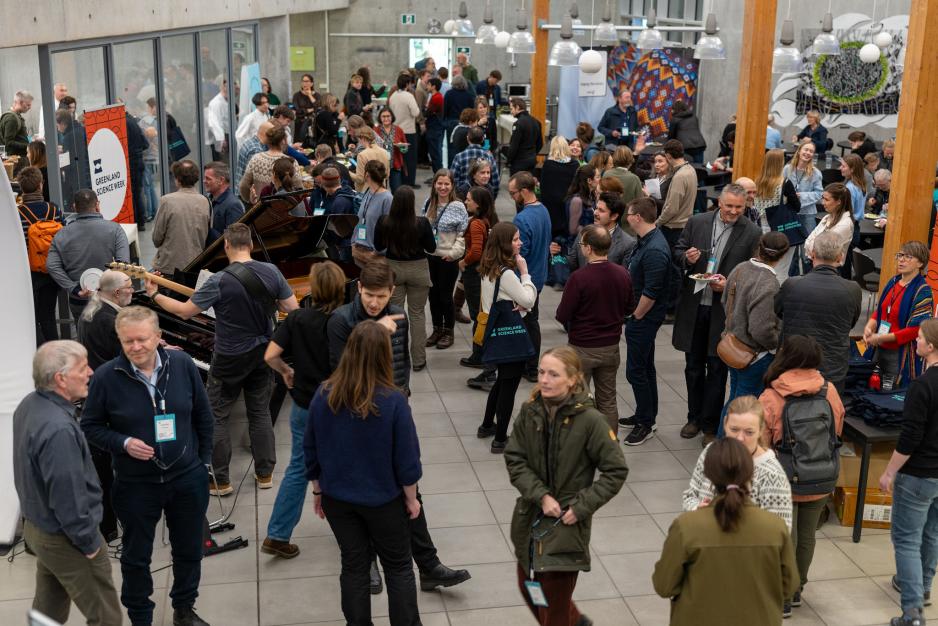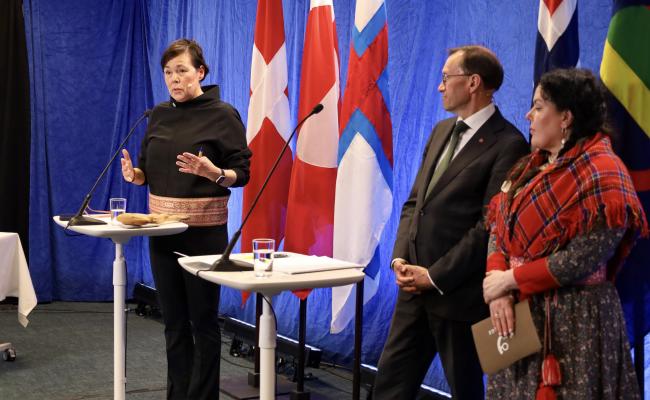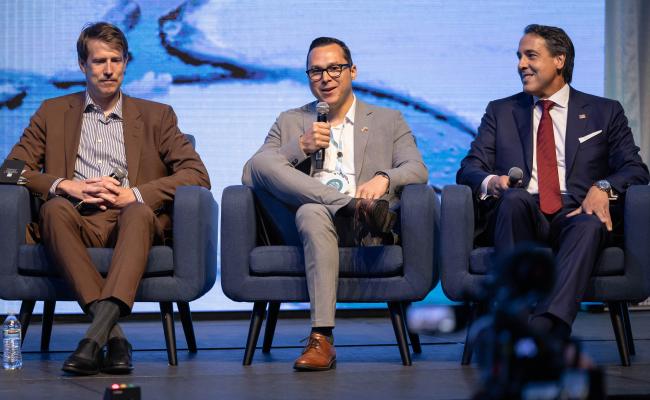Greenland Science Week: Researchers From 20 Countries Meet in Greenland: “Shows That Research in Greenland Is of Great Importance”
Avijâja Rosing-Olsen is the Head of Secretariat at Arctic Hub, which is organizing the Greenland Science Week this year. A weighty objective of this year's Science Week is to bring science to the public. (Photo: Birgitte Annie Hansen)
Nuuk, Greenland (High North News): This week, almost 400 researchers from 20 countries have gathered in Nuuk for the Greenland Science Conference. "We must find a way to utilize this increased attention in Greenland for something constructive and meaningful," says Head of Secretariat at Arctic Hub, Avijâja Rosing-Olsen.
There has been increased international interest in research in Greenland in recent years. This week, the Greenland Science Conference in Nuuk is trying to answer how this can be turned into real value and change for the country.
The Greenland Science Conference in Nuuk is part of the nationwide Greenland Science Week and is organized by the Arctic Hub.
High North News met with the Head of Secretariat at Arctic Hub, Avijâja Rosing-Olsen, during the conference to discuss its significance following a year of intense attention on Greenland.
This year, nearly 400 researchers from 20 countries are participating in the conference, which is taking place at Greenland's Cultural Center, Katuaq.
"It shows that research in Greenland is of great importance – not only for us here in the country, but for the entire world," says Rosing-Olsen.
"We have experienced a rise in international interest in research in Greenland. We chose this year's theme, 'All eyes on Greenland,' because we must find a way to utilize this increased attention in Greenland for something constructive and meaningful."
The spotlight has been on Greenland in recent years, due to US President Donald Trump's repeated comments about acquiring the country, as well as the effects of climate change on the island. The massive ice sheet covering about 85% of Greenland is melting, revealing untapped natural resources, such as rare minerals.

This year, the Greenland Science Week is being organized by the Arctic Hub. Its Head of Secretariat, Avijâja Rosing-Olsen, says there is increased international interest in research in Greenland and that the conference seeks to answer how Greenland can benefit from this. (Photo: the Arctic Hub)
Rosing-Olsen says that the Greenland Science Week was first organized in 2019 and is a biennial event. This is the first year that the Arctic Hub is the main coordinator of the week.
"The purpose of the week is to gather scientists, to create a space for them to meet each other, discuss, and coordinate," she says, and adds:
"So much research is taking place in Greenland. This is a place for all of us to coordinate so we don't duplicate each other's work, and the other purpose is focused on the Greenlandic public."
Public science festival
To engage the Greenlandic public, the Science Week invites everyone to a public science festival called Qaagitsi.
"To this event, we invite people from schools, kindergartens, retirement homes – anyone, really – to come and learn about research taking place in Greenland. In addition, it will be a chance for researchers to learn from the Greenlandic public.
The Qaagitsi public science festival invites everyone interested to participate in a day of knowledge-sharing, science talks, workshops, and other activities.
The visitors can tour the researchers' booths to exchange ideas, try interactive displays, and explore the exciting research taking place in Greenland, from field instruments to models, maps, and photos.

The Greenland Science Conference has 375 registered participants from 20 different countries. These are higher numbers than in earlier years, but the Arctic Hub has focused on marketing the conference to a wider audience, says Rosing-Olsen. (Photo: the Arctic Hub)
At the opening of the conference, several panelists emphasized the importance of science reaching the people of the Arctic, as well as being relevant and useful to them.
"It can be difficult for researchers to find people to connect with, local anchors to cooperate with. We're trying to build these bonds and ensure that local Greenlanders who are interested in participating in research projects have the opportunity," says Rosing-Olsen.
She adds that another important objective is to spark curiosity among Greenlandic children and youth so that they might pursue a career in research.

The conference's opening speech was made by Vivian Motzfeldt, the Greenlandic Naalakkersuisoq (Minister) of Foreign Affairs and Research. She emphasized that science in Greenland must benefit Greenland and that the country should always have the opportunity to be included in any research conducted. (Photo: the Arctic Hub)
The importance of dissemination
Vivian Motzfeldt, the Greenlandic Minister of Foreign Affairs and Research, held the opening speech at the conference and also referred to the increased interest in Greenland and its research.
"The conference's theme, 'All eyes on Greenland,' is very befitting. It has felt like that at times, and I can attest to that fact," she said and thanked Greenlandic researchers for their efforts to create new knowledge and facts at a time when knowledge is under pressure.
Motzfeldt also underscored the importance of science reaching the Arctic people and the inclusion of Indigenous and local knowledge.
"I believe that involving Indigenous Peoples' knowledge, as well as local knowledge, along with understanding how to engage with more ways of knowing, will make international research better."
"Another important point for me is that dissemination and knowledge exchange must be required and integrated in project planning and therefore also in budgets from the very beginning," she stated, and concluded:
"It is essential to give back to the people, communities, and countries that have provided knowledge and data."



